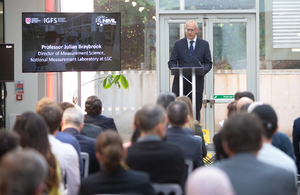-
NHS patients to have access to next generation of mRNA vaccines and treatments as Moderna set to build state-of-the-art research and manufacturing centre in the UK
-
Company to establish a global clinical trials base, endorsing UK as a science superpower
-
Large manufacturing centre will give NHS patients guaranteed access to Covid jabs, future-proofing UK against emerging health threats
-
Government and Moderna reach agreement in principle for strategic partnership
NHS patients will have access to the next generation of vaccines and treatments following an agreement between the government and Moderna to build a state-of-the-art manufacturing and research and development centre in the UK.
The new mRNA Innovation and Technology Centre will develop cutting-edge mRNA vaccines for a wide range of respiratory diseases, including Covid vaccines that can protect against multiple variants, helping to future-proof the UK against potential emerging health threats.
The pharmaceutical company will also open a large-scale mRNA manufacturing centre, which will offer UK patients guaranteed access to Moderna’s Covid vaccine and the ability to produce jabs targeting a range of other illnesses, such as flu and Respiratory Syncytial Virus (RSV), ensuring NHS patients can access the latest advancements in vaccine technology quickly and providing a consistent home-made supply for the UK. It’s anticipated the new facility will lead to job creation.
The centre will be able to scale up production rapidly in the event of a health emergency, significantly boosting the UK’s ability to respond to future pandemics.
mRNA technology has proven to be one of the fastest routes to develop highly effective vaccines during the pandemic and has been pivotal in protecting people. It has the potential to be a transformative breakthrough technology in a number of disease areas, including cancer, flu, dementia and heart disease. The new research centre will look to unlock this potential by developing revolutionary treatments in the UK which will benefit NHS patients and people worldwide.
Construction is expected to commence as early as this year, with the first mRNA vaccine due to be produced in the UK in 2025.
This strategic partnership builds on the strong relationship formed between Moderna and the government through the pandemic. Moderna has worked closely with the Vaccine Taskforce, supplying Covid vaccines used in the initial rollout as well as subsequent booster campaigns.
Prime Minister, Boris Johnson said:
We are bringing supercharged, home-grown vaccines right to our shores. I want the UK to be the brightest and best in research and technology, creating more jobs and securing our economic future.
Our investment will guarantee jabs in arms against some of the toughest viruses out there, bringing us to the forefront of the fight against future threats. We’ve all seen what vaccines can do, and today’s partnership brings us one step closer to finding cures for some of the most devastating diseases.
Health and Social Care Secretary Sajid Javid said:
Our new partnership with Moderna will cement the UK’s status as a science superpower, significantly boosting the economy and creating jobs – and it has the potential to unlock the next generation of cutting-edge vaccines to fight diseases such as Covid, seasonal flu and RSV.
mRNA is a truly transformational technology and we have seen its life-saving power during the pandemic.
Thanks to this new deal, NHS patients will benefit from scientific breakthroughs and the new state-of-the-art manufacturing centre will boost our ability to respond to the next pandemic by ensuring we’re able to produce vaccines rapidly on our own shores.
Stéphane Bancel, Chief Executive Officer of Moderna, said:
We are excited to be able to continue our collaboration with the UK Government and Vaccine Taskforce with this new mRNA Innovation and Technology Centre in the UK. The UK has established a world-class life sciences and research community.
We are committed to global public health, and as we continue to expand internationally, we are pleased to bring local mRNA manufacturing to the UK. We look forward to establishing our R&D activities and capabilities in the country.
Moderna plans to expand its presence in the UK through investments in R&D and will deliver a large share of its clinical trials in the UK.
The outline agreement with Moderna, negotiated by the Vaccine Taskforce and supported by the Office for Life Sciences, signals the start of detailed talks with the intention of establishing a long-term partnership. As the agreement is finalised, further details on the new centre will be announced in due course.
The partnership will support the Life Sciences Vision that was launched in July last year, setting the ambition for the UK to become the leading global hub for life sciences, helping to boost the country’s status as a science superpower.
Patrick Vallance, Government Chief Scientific Adviser, said:
The establishment of the Moderna mRNA Innovation and Technology Centre is great news for the UK’s R&D activities and future capabilities.
Rapid cutting-edge vaccines were vital in the response to the Covid pandemic. Developing the next generation of mRNA vaccines will be crucial in boosting our ability to prevent and respond to a wide range of diseases in the future.
The government has invested £395 million to secure and scale up the UK’s vaccine manufacturing capabilities since the beginning of the pandemic and plans to invest further alongside industry to strengthen the country’s domestic vaccine resilience. The government’s investments together with this potential partnership will mean the UK is better placed to deal with the wider consequences and effects that we have seen result from a health emergency.
The UK led the way during the pandemic by hosting various clinical trials for Covid vaccines and discovered the first treatment for Covid – dexamethasone – which has saved more than a million lives worldwide. The UK’s RECOVERY trial is responsible for identifying four successful Covid treatments.
Clinical trials are used to determine whether a new treatment is safe and effective. All treatments must undergo three robust stages of trials to gather enough data for medical regulators to approve them for use in humans.



